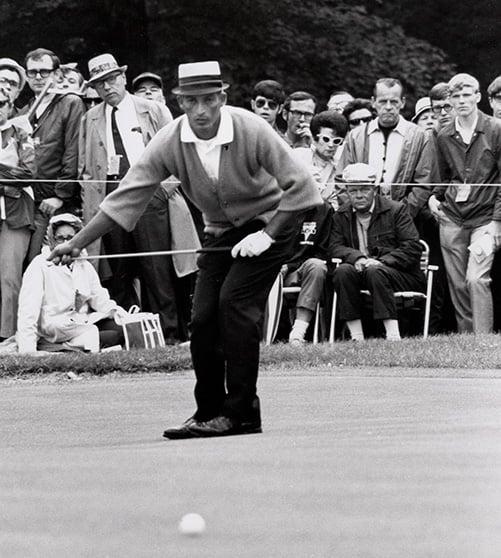
September is Hispanic Heritage Month
When Juan “Chi Chi” Rodriguez received the USGA’s Bob Jones Award in 1989, he was humbled.
“I can honestly say I have never been so thrilled, that you have seen fit to give me the most prestigious award in the world of golf,” said Rodriguez. “And I am so excited, I don’t care if I rightly deserve the award or not.”
Three years later, Rodriguez was inducted into the World Golf Hall of Fame. In both instances, the honor was not only richly deserved – but also among the most unlikely in their respective histories. As the USGA’s Golf Journal put it at the time, Rodriguez “is a rare presence in our game.”
The son of a laborer, Rodriguez was born on Oct. 23, 1935, in Rio Piedras, Puerto Rico, and he was immediately lured away from the hard labor of the sugar-cane fields to a golf course near his house. The diminutive Rodriguez was not allowed to caddie until age 9, and he fashioned his first ball and club out of a crumpled tin can and a guava tree limb.
He came in second in the Puerto Rico Open at 17, and his game really developed during a two-year stint in the U.S. Army. When he returned home, he took a job at the Dorado Beach Resort under former PGA Tour pro Pete Cooper. With Cooper’s tutelage, and with the financial support of Cooper, resort founder Laurence Rockefeller and others, Rodriguez began playing the PGA Tour in 1960.
One of the smallest golfers of his era at 5-foot-7 and 130 pounds, Rodriguez adopted the name Chi Chi in honor of his idol, Puerto Rican baseball star Chi Chi Flores. He belied his stature to become one of the longest hitters on Tour, and his breakthrough season was 1964, when he placed ninth on the money list with two victories, including a one-stroke win over Arnold Palmer in the prestigious Western Open.
Rodriguez, who turned 83 last October, won eight times on Tour, but he is best known for his crowd-pleasing gestures and his philanthropy. Chi Chi celebrated a birdie by placing his trademark straw hat over the hole or performing a mock sword dance with his putter. But he would turn serious when talking about his tireless efforts on behalf of disadvantaged children.
“Why do I love kids so much?” Rodriguez would say. “Because I was never a kid myself. I was too poor to really have a childhood.”
Rodriguez played for Puerto Rico 12 times in the World Cup and he was a member of the winning USA Ryder Cup team in 1973, but he had his biggest success when he turned 50. In his first year on the PGA Tour Champions – originally named the Senior PGA Tour – he finished in the top 10 in 23 of his 25 events, with three victories. He won seven times the following year, with 14 top-three finishes, and led the money list. He still holds the Tour record for consecutive wins with four in 1987.

Rodriguez captured a pair of senior major titles and lost in an 18-hole playoff to Jack Nicklaus in the 1991 U.S. Senior Open at Oakland Hills. The two are close friends, and Nicklaus credited Rodriguez’s short-game tutelage with helping him win the 1986 Masters, his final major-championship victory. Rodriguez’s final event as a professional came in 2012, when he played in the Puerto Rico Open on an honorary basis.
Rodriguez enlisted Nicklaus for a series of exhibition matches, the proceeds of which helped establish the Chi Chi Rodriguez Youth Foundation, which began as an after-school program in 1979 and now sits on 170 acres in Clearwater, Fla. It assists up to 600 at-risk children annually through its academy, golf course, sports complex and an affiliated program run by The First Tee.
The entertaining Rodriguez was known to counsel recreational players who were interested in buying an instructional book that they should buy the shortest such book available. Not coincidentally, Rodriguez's “Secrets of Power Golf,” published in 1967, was only 78 pages long.
His skill as an instructor is exceeded only by Rodriguez’s goal of providing life lessons to children, which was spurred in earnest by a visit with Mother Teresa in the Philippines, which he called “the best 45 minutes of my life.” In 1994, Rodriguez was an inaugural inductee in the World Humanitarian Hall of Fame, and in 2010, he received the Congressional Hispanic Caucus Institute’s Service Award for his efforts to provide opportunities for Latino youths.
As Rodriguez has often said, “A man never stands taller than when he stoops to help a child.”